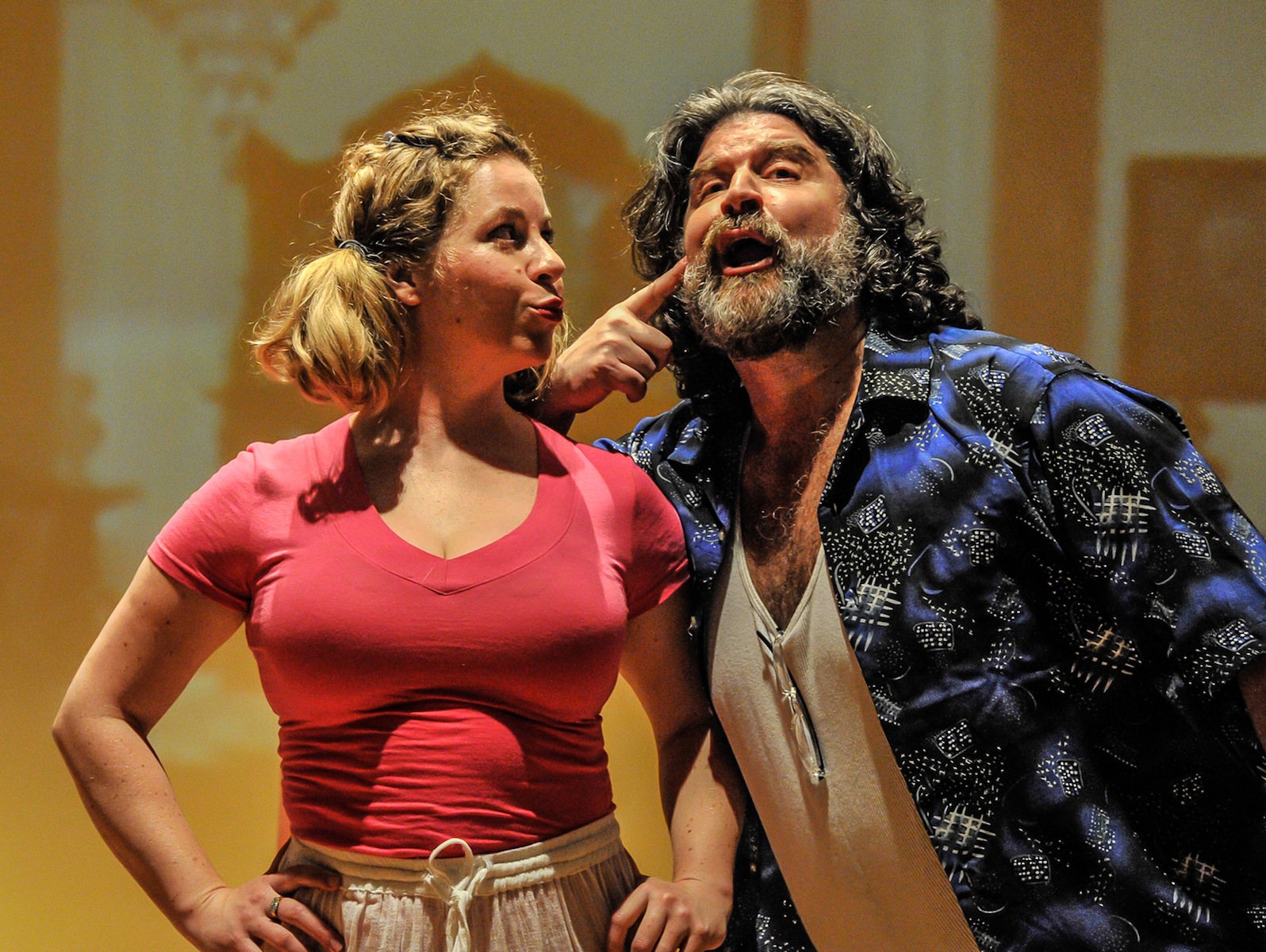Upstart New York opera company puts the casa back in “Don Pasquale”

Amelia Watkins as Norina and Peter Castaldi as Don Pasquale in "Don Pasquale & His Trophy Wife," presented by Underworld Productions Opera Tuesday night at NYU. Photo by Lee Wexler/Images for Innovation.
The garden scene occupies a special place in opera buffa. Set most often at night and towards the end of the drama, it offers a charmed moment, a collective holding of breath, before the imbroglio is revealed and confusion gives way to order and harmony.
Donizetti’s Don Pasquale offers a garden scene toward the end of Act III that sets the sweet simplicity of Ernesto’s serenade and his subsequent duet with Norina inside a halo of dramatic irony. The audience, after all, knows that Pasquale and Malatesta are just hidden from view eavesdropping on the two lovers, and knows, too, that it is in fact Pasquale, crouching in the bushes, who is being set up.
Tuesday’s Underworld Productions Opera performance of Don Pasquale offered a fresh take on the scene when it invited audience members to join the cast in the actual courtyard garden of NYU’s Casa Italiana Zerilli-Marimò, turning viewers into accomplices. That finale was the highlight of a witty production that combined a gently tweaked storyline with an intimate setting that gave audience members a rare chance to experience opera up close.
In the past, Underworld Productions have offered twists on Rameau’s Pygmalion and Mozart’s Così fan tutte, the latter by allowing audience members to vote via SMS for the final configuration of the couples. The current production, Don Pasquale & his Trophy Wife will be performed with orchestra tonight and Thursday at the Abigail Adams Smith Auditorium. Tuesday night’s performance, staged in the form of a house party in which guests followed the action around different rooms of a nineteenth-century brownstone in the West Village, was a delightful preview despite the acoustic limitations and bare-bones piano accompaniment.
The production’s director, UPO founder Gina Crusco, explains in the program notes that she decided to re-envision Pasquale “not as an elderly bachelor, but as a man who would throw over his aging Signora to make the beautiful, much younger Norina his ‘trophy wife.’” In the process, she creates the new character of Signora Pasquale, sung ably by Juliana Valente, who is for the most part a silent accomplice in the plot against her husband, but is also given a few bars of music taken from the role of the false notary, some choral passages, and a few lines from Norina’s Rondo finale.
Otherwise, Donizetti’s creation is left largely intact, though updated with contemporary costumes and tongue-in-cheek English surtitles that offer a liberal sprinkling of designer brand names, text messaging acronyms and even a knowing wink at the flailing euro.
That it transcends mere cuteness is largely due to the formidable acting skills and vocal authority of baritone Peter Castaldi who inhabits the role of Pasquale with absolute conviction. The contrast was uncanny between his appearance — an unkempt, grizzled slob favoring wif-beater undershirts stretched tight over a bulging belly — and his crisp, articulate delivery of Donizetti’s rapid-fire vocal lines. When his new “wife” slaps him in the face for trying to block her from going out, his expression of shame and dismay was so convincingly portrayed that the sudden shift in sympathies inside the auditorium was palpable.
Amelia Watkins brought a megawatt smile to the role of Norina and matching vocal power to the top notes that sometimes proved a challenge for the tight interior acoustics. As she scrolls through her Facebook page dressed in pajamas, we learn that she likes the color pink, Romcoms, and to “goof around.” Watkins possesses a bright soprano and a great deal of agility in fast passages; in the garden scene duet with Ernesto, she added a welcome note of warmth.
Ernesto was sung by Nils Neubert, whose light, lyrical tenor is a good match for the part. As the most passive character in the opera he stayed true to type, bringing a somewhat discombobulated air to the young lover that clings to him even after he has been clued in on the plot. In Sogno soave e casto he showed off a smooth, pure tone and fine sense of phrasing.
Matthew Singer was an elegant Malatesta. A more restrained actor, he made deft use of vocal shadings to negotiate the many layers of irony given his character. An ensemble of young singers enlivened the chorus of servants with clean dynamic contrasts and vibrant colors. Subsequent performances will allow music director Domenico Boyagian to add to these as he takes the helm of a pared-down instrumental ensemble.
The house party setting underscored the freshness and humor of Donizetti’s opera. It also turned audience members into guests, who were greeted with wine and cheese upon arrival. By the end of the evening, as they were sent home with a hearty “buona notte” from the members of the cast, there was a feeling of a shared experience more than performance.
Don Pasquale and his Trophy Wife will be repeated 7:30 p.m. Wednesday and Thursday at the Abigail Adams Smith Auditorium in New York City. www.brownpapertickets.com/event/236666